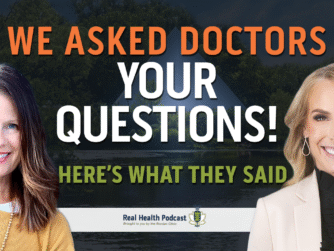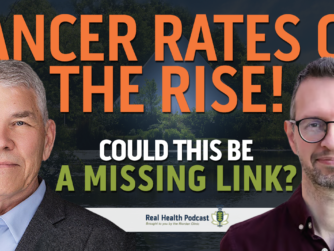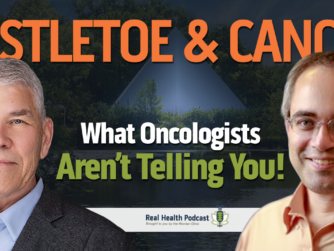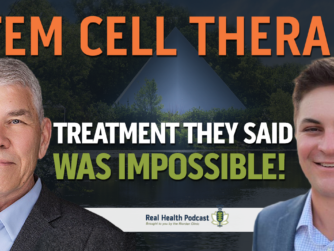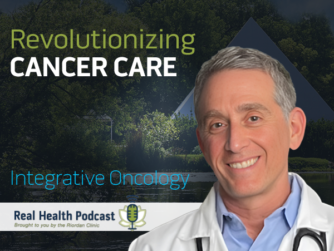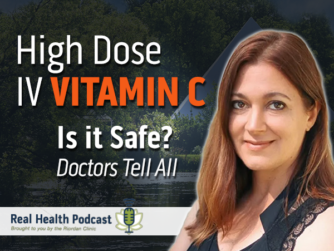Dr. Hunninghake, MD, Chief Medical Officer, introduces Dr. Kirsten West, ND, LAc, FABNO, the Riordan Clinic’s newest integrative oncology provider. She is a naturopathic oncologist and discusses her background and what inspired her to practice as a naturopath and oncologist. She began her practice with the Riordan Clinic on July 11, 2022.
Thank You To This Episode’s Sponsor
Episode Links and Promotions
Episode Transcript
Disclaimer: The information contained on the Real Health Podcast and the resources mentioned are for educational purposes only. They are not intended as, and shall not be understood or construed as, medical or health advice. The information contained on this podcast is not a substitute for medical or health advice from a professional who is aware of the facts and circumstances of your individual situation. Information provided by hosts and guests on the Real Health Podcast or the use of any products or services mentioned does not create a practitioner-patient relationship between you and any persons affiliated with this podcast.
Intro: This is the Real Health Podcast, brought to you by Riordan Clinic. Our mission is to bring you the latest information and top experts in functional and integrative medicine to help you make informed decisions on your path to real health.
Dr. Ron Hunninghake: Well, everyone, this is Dr. Ron Hunninghake. Thank you for listening in once again to our Real Health Podcast. It is truly my wonderful delight today to have Dr. Kirsten West as our guest. Dr. West is joining the Riordan Clinic. Dr. West, how does that feel to be coming aboard the Riordan ship?
Dr. Kirsten West: It’s exciting, it’s exciting, going to be part of the team.
Dr. Ron Hunninghake: Part of the team.
Dr. Kirsten West: Yeah.
Dr. Ron Hunninghake: Yeah. Well, I know everyone that’s listening in want to know a little bit about your journey. I thought rather than just jumping onto the immediate, let’s go back a ways. You are a naturopathic oncologist, and maybe you could tell our listeners a little bit about what that means.
Dr. Kirsten West: Yeah, I’m a naturopathic doctor. Naturopathic doctors go through four years of naturopathic medical school, very similar to standard of care medical school or allopathic medical school, except we have to learn all of the supplements and the drug interactions and things like that. We’re also taught to get a little bit more to the cause of disease. Throughout medical-
Dr. Ron Hunninghake: This what I missed during my medical school training.
Dr. Kirsten West: Yes, yes. Oh, and nutrition, we can’t forget the nutrition piece too.
Dr. Ron Hunninghake: After I found out about naturopathic education, I thought, wait a minute, that’s what I really wanted to do, but there was no such thing, at least that I didn’t know about it back here in Kansas. But anyway, you lucky person, you. You learned about all this really good stuff.
Dr. Kirsten West: Yeah, I kind of fell into it. I fell into it because my mom is a nurse. I originally wanted to be a medical doctor and I shadowed many doctors at University of Colorado. I realized it wasn’t really pulling up my heartstrings as much as I thought it was going to. When I stumbled across naturopathic medicine, she was the one who was really like, “I think this is where healthcare is going and I think that this is what you should consider.” Yeah, so went to naturopathic medical school.
Dr. Kirsten West: I have always had this passion for oncology. I developed a passion for oncology late college when my grandmother got sick. There’s a whole story there, but lo and behold, middle of naturopathic medical school, I met some incredible naturopathic doctors who specialized in oncology and got to know them really well. Through those connections and through that passion driving me forward, I was able to travel to all the residency sites where naturopathic doctors worked alongside medical oncologists and really put myself out there.
Dr. Kirsten West: When it was time for residency to come, which I really wanted, I wanted an oncology-based residency, I was offered all of them. I got to choose which one I went to, and I chose Philadelphia. I was a Colorado girl, I was like, “Well, let’s try the East coast for a couple years. So went out to Philadelphia, worked at Cancer Treatment Centers of America for a couple years. Dr. Tims I know was in Oklahoma and he did his residency there. That’s been the journey into oncology. Since then, that’s what I’ve done since I’ve graduated, is just worked with oncology patients.
Dr. Ron Hunninghake: Our listeners, of course, everyone’s got to know what an oncologist is, you take care of patients that have cancer, but what is it that makes a naturopathic oncologist different and what attracted you to that?
Dr. Kirsten West: That’s such a good question. Medical oncologists are so wonderful at going after the cells and we need that, we need that conventional aspect or standard of care for medical oncology because we do need to be focused on the cells, but what we forget about is the person through those treatments. Supporting the person, helping to change the terrain in which the cancer has been able to grow in the first place, that’s the niche that had so long not been filled. When I discovered this, it was like a light bulb that went on and I was like, “Wow, what a need, what a need in medicine.” It drove me to practice the way I practice.
Dr. Kirsten West: I also love the idea of collaboration. I think that it’s so important to work as a team. It’s not one way or another, but we can actually leverage some of those standard of care therapies to work better while supporting the patient through it all so that at the end they have better outcomes than they would have.
Dr. Ron Hunninghake: Yeah. Dr. Tims and I, when we’re talking about this topic, we oftentimes use the analogy of the weed and the garden, or the weeds and the garden. Basically, using that metaphor, what are some of the things that you do in terms of making the soil healthier, making it better so that the weeds aren’t as likely to grow or to continue to grow?
Dr. Kirsten West: Yeah, big thing is patient history, really learning about where they’ve come from. That’s everything, it’s from previous health conditions, to stressors, to trauma, childhood trauma, all of those things. Then as you start to get closer to when the disease began, we have to remember that most cancers begin approximately seven to 10 years before we see them, so it’s really getting a good history. Then there’s the labs. Labs, nutrient testing, things like that, help us to see what the body is telling us that the patient can’t tell us. When you put all of that together, that’s when you get the terrain.
Dr. Kirsten West: Then, of course, you can also tie in epigenetics, additional hormone testing, things like that. We talked about nutrient profile, I mentioned nutrient profiles, environmental toxicants, all of those things help us to discover where the imbalances are, because it’s unlikely that these imbalances were there just a couple weeks ago, cancer is a process. We need to help to start unweaving those imbalances to get the patient back to health. That’s what empowers patient, because we can teach them to understand what it is they need to do to get them where they need to be.
Dr. Ron Hunninghake: At the Riordan Clinic, the people who are listening in that know anything about the Riordan Clinic, we’re really big on testing and measuring and trying to understand the biochemical underpinnings of any chronic illness. Certainly, we are interested in the individual as a person. Of those different terrain elements that you’ve talked about, what, in your experience, seems to tell the biggest story that oftentimes doesn’t get looked at when a patient goes to see their oncologist?
Dr. Kirsten West: Dr. Ron, I think it’s so much. I think that one thing that Dr. Nasha Winters did, which was so profound, she and Jess Kelly, was create that Terrain Ten approach, because if patients could take that quiz, that Terrain Ten quiz, and for those who aren’t familiar with, it’s found in the Metabolic Approach to Cancer, that’s one way you can get it, but you, as a patient, can start to go through and figure out, gosh, these may be the primary reasons why I may be where I am now. The patient can start to do that, but as doctors I think it’s also important for us to ask the questions that patients don’t get asked by other doctors, such as childhood trauma, what’s going on in your relationships in your life, stressors, et cetera, et cetera. That all ties in.
Dr. Ron Hunninghake: Oftentimes, it’s ironic that in my own sense, but also in the patient sense, those kinds of things are invisible to them.
Dr. Kirsten West: Right.
Dr. Ron Hunninghake: I just went through the ten with a lady earlier this week, a wonderful lady, and as we were checking off all the yeses, she says, “Oh my gosh, I didn’t realize, are all of these things related to cancer?”
Dr. Kirsten West: Yeah.
Dr. Ron Hunninghake: Most people think of cancer as just this foreign thing growing in them that just came out of nowhere, and yet, when you start to see that all these various elements can be carcinogenic besides just a chemical here or a plastic there, but all these different elements, it really begins to get people thinking about how their whole life may have set them up for this and that they’re going to have to make some pretty big changes if they’re going to change that.
Dr. Kirsten West: Right. We’ve been trained to think that it’s a somatic mutation, it’s genes that cause cancer, or it’s a luck of the draw. We never want to place blame on ourselves for disease or place blame on anyone else, but it’s taking responsibility. Responsibility just means response able, what can you do to now make changes to get you where you need to be? The intent for me has always been, and I know for you too, is to get people feeling better than they ever felt prior to getting cancer.
Advertisement: There’s a lot more to this conversation, and it’s coming up right after a quick break. Today’s podcast is brought to you by Bio-Center Laboratories. The Bio-Center Laboratory provides state-of-the-art lab testing and diagnostic services for healthcare providers, laboratories, hospitals, and the general public. Lab tests available through Bio-Center include a comprehensive list of vitamins, minerals, fatty acids, amino acids, hormones, and pyrroles. They also provide a variety of standardized tests for disease markers. These markers include cardiovascular disease, diabetes, thyroid dysfunction, hormone imbalance, and more. Visit biocenterlab.org to learn more.
Dr. Ron Hunninghake: I tell people, I said, “If we do this well together,” I say, “You are going to be healthier. You’re going to feel better than you’ve ever felt, in spite of the fact that you’ve got cancer, because you’re going to be addressing all those elements that maybe was dragging your health down, but you didn’t realize it,” because we get used to being sick. We assume this is our norm because we can only live in ourselves. The role of the oncologist or the health-related naturopathic doctor or whatever, whatever kind of practitioner is willing to go down this path with their patient, that role is to enlighten the patient to a path to better health.
Dr. Kirsten West: Exactly, exactly. I love the term co-learner, because I think that patients actually may not consciously know, but subconsciously at some level know the changes that need to be made. If we can help to bring those things out, we’re in an even better spot.
Dr. Ron Hunninghake: Well, a serious illness like cancer, it’s lonely. It’s really lonely because a lot of your family and a lot of friends, oftentimes they’ll back away. This scares everyone. It’s so nice to make a connection with patients and say, “Hey, we’ve got something that will not only help you deal with this cancer, but you’re going to be healthier than you’ve ever been because this is the pathway you can now walk towards strengthening your immune system, controlling inflammation, making dietary changes that you always wanted to made make,” but we always keep putting those things off. But once you’ve been given the C word, it does start a whole new process of reviewing what really is important in my life now, because it changes everything.
Dr. Kirsten West: Right. All of a sudden, and I know I hear this from so many patients when they’re diagnosed, everybody becomes an expert about what they need to be doing. It becomes not only the disease is stressful and fearful, but then it becomes stressful because they’re trying to navigate it all. That’s the beauty of what we can do as a team, is really help to support that patient, help them feel not alone, but help to take that weight off their shoulders, to guide them as to what really is important.
Dr. Ron Hunninghake: And we are able to do it in an integrative way.
Dr. Kirsten West: Yes.
Dr. Ron Hunninghake: So many patients feel like, “Oh, okay, I’ve either got to go alternative or I’ve got to go completely orthodox.” What we’re saying, “Hey, you really don’t have to give up either one. You want to get the best of both worlds.” In an average patient visit, how does that happen with you?
Dr. Kirsten West: Well, gosh, I get patients across the board. I get patients who come and they say, “I don’t want to do any type of conventional care.” Because I truly feel like if there is a chance for cure, let’s shoot for that chance for a cure, even if that means we need to use some conventional care, because we’re going to support you through it to get you better than you ever were. That’s when I’m hoping that I can bring the data together or empower them enough to realize that let’s let go of the fear around conventional care and use it to our advantage and leverage it.
Dr. Ron Hunninghake: You just made me think of something, a lot of the people who have heard the horrors of conventional care, they haven’t had the support of nutritional, stress management, focus on healing wounds, emotional wounds, psychological wounds. The whole focus on the whole person is a strengthening process so you’re better able to withstand the slings and arrows of conventional therapy.
Dr. Kirsten West: Yeah. Yeah. I have a patient that comes to mind when we talk about this. She had, I think it got to stage 3 breast cancer and she was so scared. She had so much fear around any type of standard of care therapy. She lived with this for four to five years, it just kept growing. Her husband was really great, but we were finally able to talk her into facing her fear. That was a big thing, this was very psychological, emotional. She ended up going through treatment and she’s now clear of disease, and to let go of that burden of something that had been weighing her down for so long, but it was facing the fear, but doing it, like you said, with a team with support, knowing that she was covered and she was held through it.
Dr. Ron Hunninghake: Okay.
Dr. Kirsten West: But it’s different for everybody, it is.
Dr. Ron Hunninghake: When you go through your day and you talk with cancer patients and work with them, what is it that you derive from this, personally? Just what is it that makes this such a fulfilling thing for you?
Dr. Kirsten West: I think the humanity piece, I think meeting together. I think that when someone is facing their mortality or whenever we’re faced with a really stressful situation, we tend to be a little bit more open and more grounded and I think that we can have these personal relationships, which are just so much deeper. I’ve noticed that with my patients. It’s not just the doctor-patient relationship, but it’s a human-human relationship. My husband always makes fun of me, I say human without the hu, human, but yeah. But it’s the human-human relationship, which is profound. I think that we can’t forget about that in healing, because that may be one of the most important aspects.
Dr. Ron Hunninghake: Whereas there’s that book, Radical Remission. What she points out in that book, which I’ve read it, but I can’t remember the author right now, but she-
Dr. Kirsten West: Kelly Turner.
Dr. Ron Hunninghake: Yes, Turner. She says, of the nine things in that book, what is it, five or six of them have nothing to do with treating the cancer, it’s about discovering your own empowerment, realizing that what you think, what you do, about this disease has as much, if not more, than whatever the doctor’s going to do or whatever even we’re going to do, that people take responsibility and they take control of their life and they realize I’m bigger than this disease.
Dr. Kirsten West: Right, right. It’s so true. You set that foundation and then everything else can flow after it.
Dr. Ron Hunninghake: It takes the fear out of it. That’s the big thing about cancer is that we do know, I mean, who hasn’t stood up for cancer because they know someone that has cancer? I can think of three or four in my family. Yet, I know that in the cases where people have not done well, I don’t think they’ve been adequately supported, like what you talk about. I know Dr. Riordan wanted that. He was a psychiatrist by training, but as a friend of Linus Pauling, he learned that vitamin C could be very beneficial, but by no means did we ever think that vitamin C alone was the answer. There’s not any one nutrient or one approach that does the job, you’ve got to-
Dr. Kirsten West: Which is why it’s the terrain, right?
Dr. Ron Hunninghake: Yep.
Dr. Kirsten West: It’s the terrain. We put the terrain together and we create harmony. You can think of it as an orchestra too, we need the orchestra, or the symphony. We can’t just have a duet, we’re not going to get where we want to be with a duet. We need the whole symphony together to harmonize the body.
Dr. Ron Hunninghake: And you have to tune the instruments.
Dr. Kirsten West: Exactly.
Dr. Ron Hunninghake: And there’s a training process, you have to know how to play the instruments. It’s nice to be able to be kind of like teachers, co-learners. As we always come back to that word, it’s a word of empowerment, it’s a word of opportunity, it’s a word of hope for a lot of people.
Dr. Kirsten West: Yeah, that’s very true.
Dr. Ron Hunninghake: Okay. Well, I think we’re just about out of time, but I’d like to give you the last word. What are you most thankful for, in terms of your career and in terms of your future?
Dr. Kirsten West: I am most thankful for the connections I’ve been able to make and the doctors I’ve been able to work with. I feel like it has been just such a blessing, because I’ve been able to pull from everybody and learn these things and it has created a whole picture for me. I know that I will continue to. As a doctor, that’s why they call it the practice of medicine, because we’re continuing to learn and continuing to grow and we need our patients to help us do that too. I’m so fortunate for the experiences that I’ve had.
Dr. Kirsten West: Moving forward, I’m so fortunate to be part of Riordan, because I think that we have just got such a great team. I know that we can all work to lift the patient up, because truly, the patient should be in the middle and we should be the ones supporting patient, patient-centered care. I feel fortunate to be able to do that.
Dr. Ron Hunninghake: Well, Dr. West, I can speak for our staff here, we’re thrilled that you have joined us and I’m thrilled to be working with such a wonderful human being. Let’s do great things, huh?
Dr. Kirsten West: Upward and onward.
Dr. Ron Hunninghake: There you go. Thanks for being on our show.
Dr. Kirsten West: Absolutely, Ron.
Dr. Ron Hunninghake: Okay, talk to you soon.
Dr. Kirsten West: Okay, talk to you soon. See you soon.
Dr. Ron Hunninghake: Bye-bye.
Dr. Kirsten West: Bye.
Outro: Thank you for listening to the Real Health Podcast. If you enjoyed this episode, be sure to subscribe and leave us a review. You can also find all of the episodes and show notes over at realhealthpodcast.org. Also, be sure to visit riordanclinic.org, where you will find hundreds of videos and articles to help you create your own version of real health.


